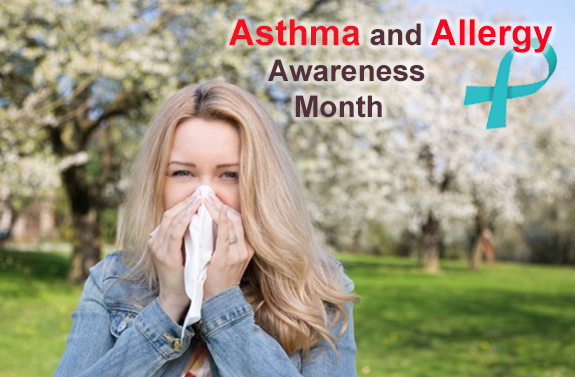May is Asthma & Allergy Awareness Month

Observe Asthma & Allergy Awareness Month with a New
Medical Alert Bracelet
May is the month for blooming flowers and fresh, new grass. It’s also allergy and asthma awareness month, and the time of year many allergy sufferers dread. The deeply relaxing and invigorating fragrances of spring also mean a release of pollen into the air, causing sneezing, coughing, itchy eyes, drowsiness, and runny noses. For people with asthma, it can even turn deadly.
Brief History of Asthma & Allergy Awareness Month
In 1984, the Asthma and Allergy Foundation of America (AAFA) named May Asthma and Allergy Awareness Month. The numbers are startling:
- An estimated 25 million Americans have asthma
- About 32 million Americans have food allergies
- Another 24 million Americans suffer from seasonal allergies, such as rhinitis, hay fever, and related conditions
Many people experience all three. These ailments can make the season millions love into a miserable and even dangerous time of year.
Common Allergens & Responses
There are several allergen types.
- Pollen
- Pet salivia and dander
- Mold
- Insects
- Latex
- Food
- Drug
Seasonal allergies are caused by pollen, which is common in the spring and fall.
Typical symptoms of pollen and pet allergic responses aren’t far off from the common cold. Most report feeling “miserable.” The most common include
- Red, itchy, watery eyes
- Sneezing
- Runny nose
- Cough
- Wheezing
- Chest tightening
- Hives
- Rashes
Rashes are linked more to allergens that absorb through the skin. You may think of poison ivy or oak, but many can cause a skin reaction, such as grass, latex, and certain metals. These reactions occur within 48 hours of exposure.
Food allergies have a different category of symptoms—gastrointestinal, such as stomach cramps, bloating, vomiting, and diarrhea.
Severe responses to insects, food, latex, and drugs are emergencies, and immediate medical attention is necessary. These include throat closing, swelling, and tongue swelling.
Asthma & Allergies: Combined Suffering
Asthma is one of the most common chronic conditions. Similar to allergies, individuals can experience wheezing, chest tightness, coughing, and breathlessness. But many people don’t understand the allergy and asthma connection. All these allergens can trigger an asthma attack, increasing the seriousness of your condition. In fact, allergic asthma is the most common type of asthma. Research indicates 75 percent of adults between 20 and 40 with asthma have at least one allergen. An estimated 65 percent of people with asthma 55 and older also have one. Other kinds include,
- Nonallergic asthma
- Exercise-induced bronchoconstriction
- COPD-related asthma
- Occupational asthma
- Adult-onset asthma
It’s essential to seek treatment and keep these conditions under control to prevent worsening symptoms.
Buy an Allergy Medical Alert Bracelet
If you or a loved one suffer from severe allergies or have asthma regularly triggered by allergens, it’s vital to have a medical alert ID. An affordable and engraved, stylish medical ID bracelet, pendant, or accessory may save your life. Suffering from an allergy or asthma attack alone in public is scary. Buy a Universal Medical Data bracelet this National Allergy and Asthma Awareness Month. An ID can help first responders quickly identify the emergency and administer aid when unable to speak or unconscious.
